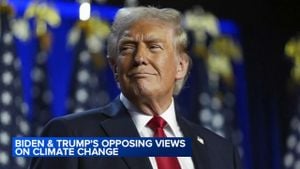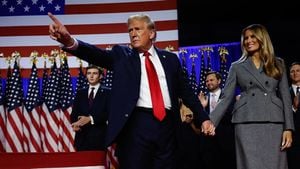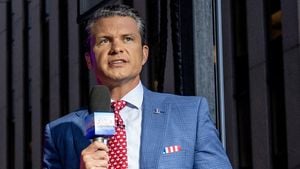Russia has taken significant steps to strengthen its ties with North Korea, marked by the recent gift of over 70 animals to the Pyongyang Zoo. This donation, which includes notable creatures like lions, bears, and yaks, symbolizes the growing collaboration between these two isolated nations.
The event unfolded following Russian President Vladimir Putin's visit to North Korea earlier this year, where he and North Korean leader Kim Jong-un signed several agreements solidifying their partnership. The gift of animals, according to Russian government officials, was described as "a gift from Vladimir Putin to the Korean people," embodying goodwill and fostering bilateral relations.
Among the star attractions of this animal convoy were two brown bears and an African lion, all transported with care on a government plane, accompanied by specialists from Moscow’s zoo to oversee their adjustment to the new environment. This isn’t the first time Russia has offered animals to North Korea; past gifts have included various birds, enhancing the Pyongyang Zoo's collection.
Local factions hosting the animals shared enthusiasm for the transfer. After the shipment, Russian Natural Resources Minister Alexander Kozlov, who accompanied the animals, remarked about the historical significance of animal gifts, stating, "Animals always have played a special role in relations between states. They have been seen as signs of support, kindness and care." This statement adds depth to the gesture, reflecting cultural practices wherein animals symbolize peace and alliance.
This exchange of fauna is set against the backdrop of military cooperation, as North Korea has reportedly sent thousands of troops to Russia to assist with the Ukraine conflict, utilizing this alliance for various operational benefits. Reports suggest North Korean forces were already actively participating on the ground, marking this as unprecedented for the nation, traditionally deterring outside military engagements.
Details released by various reports highlight how up to 12,000 North Korean soldiers have been integrated within Russian ranks, with intelligence affirming their involvement since the escalation of the conflict following Russia's invasion of Ukraine. This collaboration has raised concerns globally, leading to heightened geopolitical tensions.
Importantly, the animal gift exchange is part of more vast strategic and military accords developed between Russia and North Korea. The comprehensive strategic partnership treaty implies mutual support, including military assistance, establishing formal ties reminiscent of Cold War dynamics. This agreement obligates both countries to aid each other using "all means" if either faces threats, formalizing their previously informal cooperation.
The animal transfer, then, becomes more than just about the fauna. It emphasizes the intertwining of military and diplomatic strategies, where animal gifts serve as both appeasement and bonding tools amid growing international scrutiny and sanctions.
Observers of this geopolitical maneuvering have noted the significant potential for this partnership to embolden both nations. North Korea’s military expansion and arms provisions to Russia—including substantial shipments of artillery and missiles—represent another facet of their collaboration, bolstering Russia's fighting capabilities as it endures pressures from NATO and Western countries.
Beyond the animal exchange, another notable tie between the two nations arrived via the gift of Pungsan dogs from Kim Jong-un to Putin after his visit. These North Korean breeds symbolize loyalty and strength, solidifying personal ties between the leaders and their respective countries.
The dynamics unraveling from this footage of military cooperation and animal gifting continue to create speculative dialogues around future alliances and repercussions on global security frameworks, particularly concerning the West's response to the re-emerging Russia-North Korea relationship.
Experts agree this fresh influx of North Korean support may plateaus Russia’s military efforts, but how this strategy will develop over time, and the long-term effects on international diplomatic relations, remains to be seen. With growing tensions surrounding both nations, particularly as they endure stringent sanctions and international isolation, what type of alliances will emerge from the shadows of this unconventional partnership? Only time will reveal the outcomes of these ambitious geopolitical gestures.



